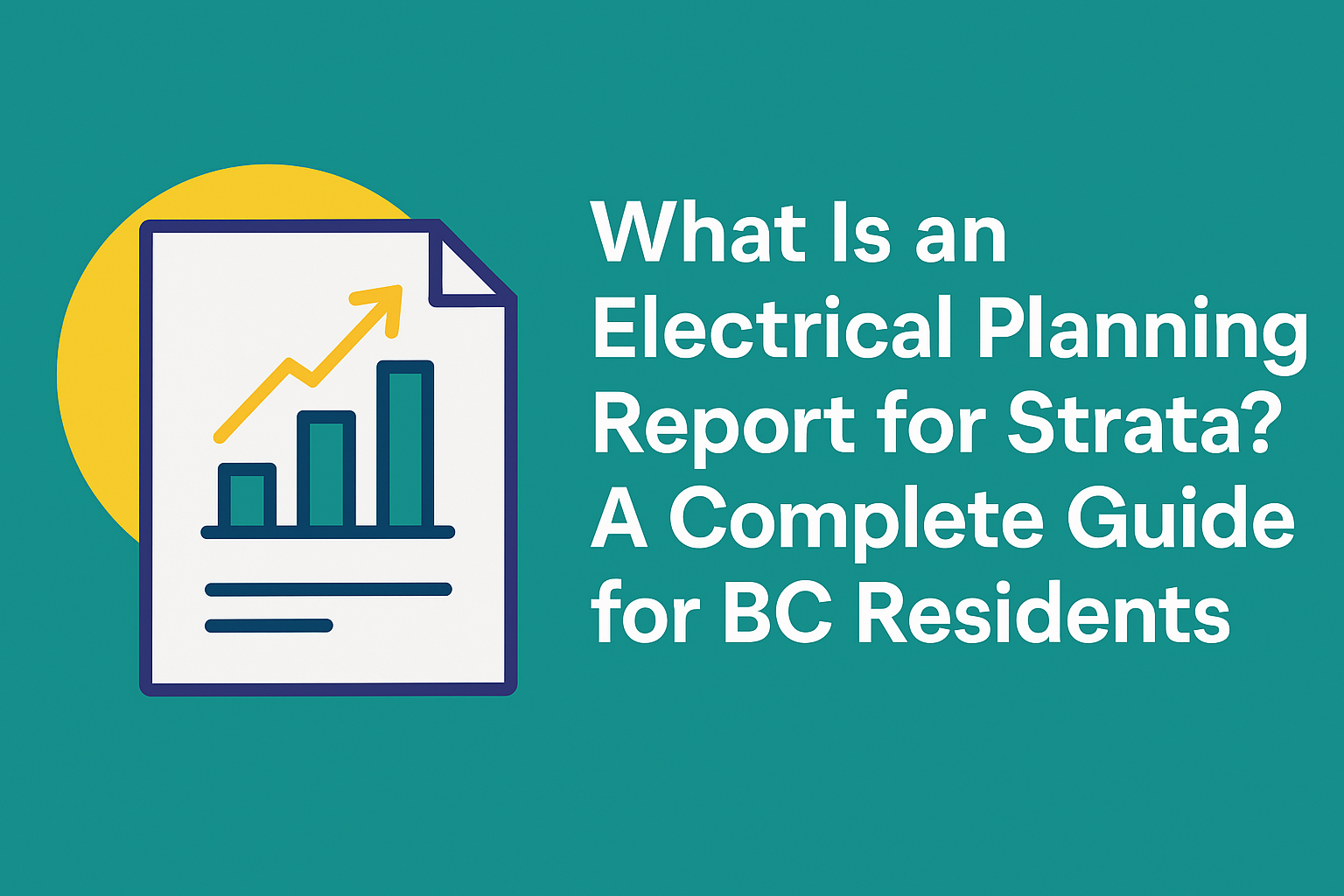What is an Electrical Planning Report?
Electrical Planning ReportsWhat Is an Electrical Planning Report for Strata? A Complete Guide for BC Residents
If you’re part of a strata council in British Columbia, you’ve likely heard a new term circulating in meetings lately: Electrical Planning Report, or EPR for short. Maybe you’ve seen it in your AGM minutes. Maybe someone mentioned it when talking about EV chargers. Either way, you’re probably wondering what it actually means—and what your strata needs to do about it.
This article is your straightforward, jargon-free guide to what an Electrical Planning Report is, why it’s required, and how it fits into the future of strata living in BC.
Understanding Electrical Planning Reports
An Electrical Planning Report (EPR) is a technical assessment of your building’s electrical system. It provides a snapshot of your current electrical capacity, analyzes what systems are using power now, and projects how much electricity your building might need in the future—especially if you’re planning to support electric vehicles, heat pumps, or other energy upgrades.
Think of it as a health check-up for your building’s electrical infrastructure.
Why EPRs Are Now Mandatory
The demand for electricity in multi-unit residential buildings is growing fast. More BC residents are switching to EVs, replacing gas furnaces with electric heat pumps, and adding modern ventilation or hot water systems.
To help buildings prepare, the Province of BC passed Bill 22 in 2023, which made Electrical Planning Reports mandatory for strata corporations with five or more units.
What Does an Electrical Planning Report Include?
A proper EPR will include both current data and future projections to help your strata plan wisely.
Core Components of an EPR
- Current electrical service capacity
- Existing loads (lighting, heating, elevators, EV chargers, etc.)
- Peak demand and spare capacity
- Forecasts of future electrical needs (e.g. if residents switch from gas to electric)
- Opportunities to reduce load (LED lighting, solar, energy management)
- Recommendations for infrastructure upgrades
- Utility delivery constraints (e.g. what BC Hydro can supply to your building)
Once complete, the EPR becomes a permanent record and must be attached to the Form B: Information Certificate for buyers or owners.
When Is the Deadline?
Your strata’s deadline depends on its location:
- December 31, 2026 – Metro Vancouver, Fraser Valley, and Capital Regional Districts
- December 31, 2028 – All other areas in BC
- New strata corporations – Must complete the report within five years of their strata plan registration
These reports are one-time only, unless major building changes occur.
Who Can Complete an EPR?
EPRs must be completed by a qualified professional, which may include:
- A licensed electrical engineer
- A registered applied science technologist
- A journeyperson electrician (for Part 9 buildings under the BC Building Code)
This ensures your report is technically sound and legally valid.
Why EPRs Matter for Your Strata
Electrical Planning Reports aren’t just about compliance—they’re about readiness. With more residents demanding EV charging and cleaner heating systems, stratas need to know if their infrastructure can support the shift.
Delaying the report could mean:
- Missed funding or rebate opportunities
- Unexpected and expensive upgrade needs
- Insurance or resale complications due to missing documentation
Summary
Electrical Planning Reports are now a required part of managing strata properties in British Columbia. They help your council plan for future energy needs, reduce risk, and ensure your building is ready for a cleaner, more electrified future.
If your strata hasn’t started this process yet, now’s the time to begin budgeting, surveying residents, and looking for qualified professionals to complete the work.
Frequently Asked Questions (FAQ)
Is an EPR the same as a Depreciation Report?
No. A depreciation report looks at your building’s physical assets (roofs, windows, etc.). An EPR focuses only on the electrical system.
What if we don’t have EVs or heat pumps yet?
That’s exactly why you need the report—to find out if your system can handle them when the time comes.
Can we do the report ourselves?
No. It must be completed by a qualified electrical professional under provincial regulations.
How long does the report take?
Depending on your building’s complexity, it could take a few weeks to a few months. It’s wise to start early.

